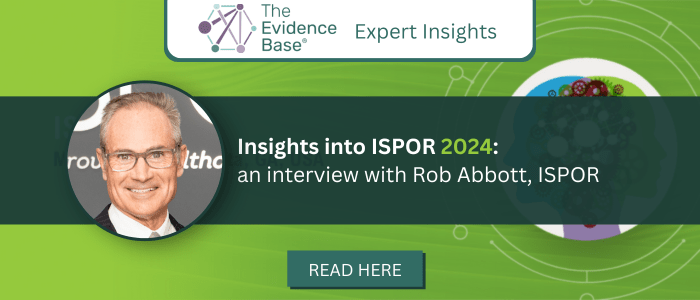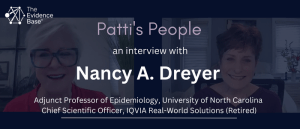Insights into ISPOR 2024: an interview with Rob Abbott, ISPOR

The global health economics and outcomes research (HEOR) community is gearing up for the highly anticipated ISPOR 2024. The conference is the annual international conference for ISPOR—The Professional Society for Health Economics and Outcomes Research taking place May 6–8, 2024 in Atlanta, GA, USA. Here, Rob Abbott, CEO, shares exclusive insights into the conference theme, program highlights, and what attendees can expect from ISPOR 2024.
Please could you introduce yourself and your role at ISPOR?
As CEO and Executive Director for ISPOR, The Professional Society for Health Economics and Outcomes Research, I lead the Society’s sustained efforts to communicate and advance health economics and outcomes research (HEOR) excellence to improve decision making for health globally. I drive and execute ISPOR’s strategy as established by the Board of Directors, advance and enhance its strategic vision, and lead the execution of its programs and activities.
ISPOR is the largest organization in the world focused on HEOR and our mission is to improve healthcare decisions by advancing excellence in the field of HEOR. As healthcare costs are rising to unsustainable levels worldwide, our mission has never been more timely or relevant.
This year, ISPOR 2024 will focus on ‘HEOR: A Transformative Force for Whole Health.’ What was the inspiration behind selecting this theme, and how does it reflect current trends in HEOR?
ISPOR 2024, our annual international conference, comes at an exciting time in the history of the Society. We will soon be launching a bold new strategy for the organization that reaches out to 2030 and seeks to position HEOR as a key tool to help forge a world in which health care is accessible, effective, efficient, and affordable for all. I’m enormously excited by this vision and the role that HEOR, and ISPOR, can play in making it a reality. The concept of ‘Whole Health’ is rapidly gaining currency as the right ‘frame’ within which to view health care.
The National Institutes of Health in the United States, the World Health Organization, and others define Whole Health as physical, behavioral, spiritual, and socioeconomic wellbeing as defined by individuals, families, and communities. This is an important point as it underscores the importance of individual patient perspectives and gives voice and self-determination to patients – and their families – in defining health.
Another important dimension here is the overarching focus of Whole Health on promoting resilience, disease prevention, and the restoration of health. It is no longer accurate to focus health care solely on the treatment of disease.
With this in mind, ISPOR 2024 will offer many opportunities to learn where and how a more deeply embedded understanding and use of HEOR can accelerate the transition to Whole Health as a healthcare paradigm.
Can you tell us more about the program committee leading the development of the agenda?
Since its inception nearly 30 years ago, ISPOR has prided itself on being a scientific society. We passionately believe that the best healthcare policy rests on a foundation of good science. The agenda for ISPOR 2024 is no exception in this regard and we’re extremely fortunate to have three extraordinary program co-chairs who have curated something very special indeed.
- Charlene Wong, MD, MSHP, is Senior Advisor for Health Strategy in the Office of the Director at the Centers for Disease Control and Prevention
- Nancy Dreyer, MPH, PhD, FISPE, is President, Dreyer Strategies LLC, Adjunct Professor of Epidemiology at the University of North Carolina at Chapel Hill, and Chief Scientific Advisor to Picnic Health
- Thomas Senderovitz, MD, is Senior Vice President Data Science at Novo Nordisk
They are joined by 30 esteemed HEOR experts from the US, Europe, Asia, the Middle East, and Latin America.
 Catch up on our interview with Nancy Dreyer here – part of the Patti’s People series.
Catch up on our interview with Nancy Dreyer here – part of the Patti’s People series.
How does the ISPOR 2024 program reflect the conference theme, and are there any specific sessions that stand out as particularly relevant or interesting to you?
I’m enormously proud of my staff team at ISPOR, and the many dedicated volunteers – on our program committee and elsewhere – that have worked together to ensure that the program really lives up to our conference theme. In considering the many abstracts submitted for inclusion in the program, for instance, we consistently asked whether they were speaking to how HEOR could be a transformative force for Whole Health. Equally, the poster sessions, the short courses, the case studies, and all of the other components that collectively make up the program have been tailored to speak not only to Whole Health, but to demonstrate where and how HEOR can facilitate, maybe even accelerate, the achievement of Whole Health.
With respect to specific sessions that I think are particularly relevant or interesting, it is always hard to single out a specific session from what is truly a feast for the mind. That said, we have a spotlight session on Day 1 that looks at Medicare drug price negotiation and the lessons from the first 10 drugs selected that I believe will be very interesting and thought-provoking. On the closing day of the conference there is another spotlight session on how to adjust economic models for health equity in the conduct of generalized cost-effectiveness analysis that is also very exciting for me. In between, we are offering 12 diverse short courses, numerous case studies and breakout sessions, member group meetings and poster sessions. We are also convening a global patient summit that underscores our desire to hear from patients and patient representatives and ensure that the patient voice is heard in decisions about what constitutes ‘value’ in health. This ISPOR Patient-Centered Research Summit 2024 is co-located with ISPOR 2024 and being held Sunday, May 5, 2024.
How is the program being tailored to cater to the diverse interests of a global HEOR audience?
The geographic and scientific/technical diversity within the program committee itself is a key mechanism to help ensure that the program meets the diverse interests of a global HEOR audience. At the same time, the program very intentionally has ‘something for everybody’ through the provision of short courses on the day before the official conference start; educational symposia; breakout sessions; member group meetings; poster sessions; and so much more.
The plenary sessions this year reflect truly global input on how to achieve Whole Health, and this reflects ISPOR’s continuing commitment to expressing its status as a global society in a way that is meaningful to a global HEOR membership.
As the ISPOR 2024 conference approaches, many, including The Evidence Base, are eager to learn more about the plenary sessions. Any sneak peeks you can share about the plenary sessions?
The plenary sessions are always one of the highlights at ISPOR conferences and ISPOR 2024 promises to uphold this tradition. Without giving too much away in advance, I can say that each session takes the theme of ‘Whole Health’ and unpacks it in a very particular way. So, for example, Plenary 1 explores the question of, “how do we know when we’re succeeding in advancing whole health?” Plenary 2 considers a path forward for HEOR data integration and what this ‘missing link’ might mean for the achievement of Whole Health. Finally, Plenary 3 will explore the role of artificial intelligence in facilitating Whole Health.
Looking ahead, how are the plans for ISPOR Europe 2024 progressing and what can attendees expect from the program? Are there any plans for other global events in 2025?
We’re excited to be in beautiful Barcelona, Spain for ISPOR Europe November 17–20, 2024. Plans for this event are progressing well and attendees can expect a full agenda at the leading global conference in Europe for HEOR. As ever, this will be a rare opportunity to network with peers, HEOR experts, and thought leaders and to discuss with a global audience how to establish, incentivize, and share value in ways that make healthcare accessible, effective, efficient and affordable for all – on a truly global basis.
Disclaimer:
The opinions expressed in this feature are those of the interviewee/author and do not necessarily reflect the views of The Evidence Base® or Becaris Publishing Ltd.
